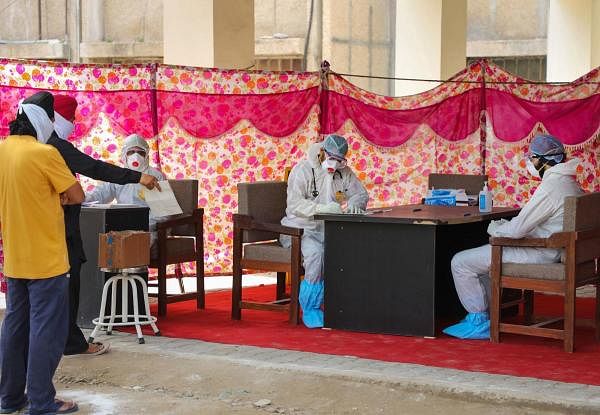
To overcome the shortage of personnel protection equipment (PPE), doctors at territory care at SKIMS hospital in Srinagar skip lunch breaks and work non-stop for eight hours in a single protective gear.
The rising demand, panic buying, hoarding and misuse of PPE is putting the lives of medical staff and health workers at risk worldwide and Kashmir is no exception. To avoid mandatory suite change after every break, the doctors, who attend COVID-19 out patient department (OPD) at the SKIMS hospital, don’t eat anything in their eight-hour-long shifts.
“Though hospital administration has made extra-suits available for breaks, we prefer not to wear them. There is a possibility of a tsunami of coronavirus cases in the coming days and we know there will be a huge shortage of PPE. By saving some this time, we are preparing for the future fight with the deadly disease,” a doctor at the hospital told DH.
He said not only most of the medical staff skip lunch break, but eat less an hour before leaving for the hospital to avoid washroom breaks as well. “Going to bathrooms means a change of suit and we cannot afford that. We have to train ourselves for this challenge,” he said.
A lady doctor at the hospital said that anxiety was pervasive among the whole staff at the SKIMS. “The doctors are also human beings. When we read about the death of healthcare workers in Italy, Spain and the UK, fear starts making a way into our consciousness. We think about our spouse and children at home,” she said.
“The challenges are not restricted to the hospital. The real battle begins after I reach home. I self-isolate myself and avoid contact with my family. I kind of keep myself in home quarantine,” the doctor said, adding taking the infection home is the last thing a doctor would want.
The doctors at the hospital, however, expressed helplessness when it comes to dealing with the shortage of the gloves. “We feel helpless. Technically, we have to change our gloves after every patient but we are unable to do so due to shortage,” they said.
Use of single gloves for multiple patients, the doctors said, puts normal patients at risk of contracting the disease.